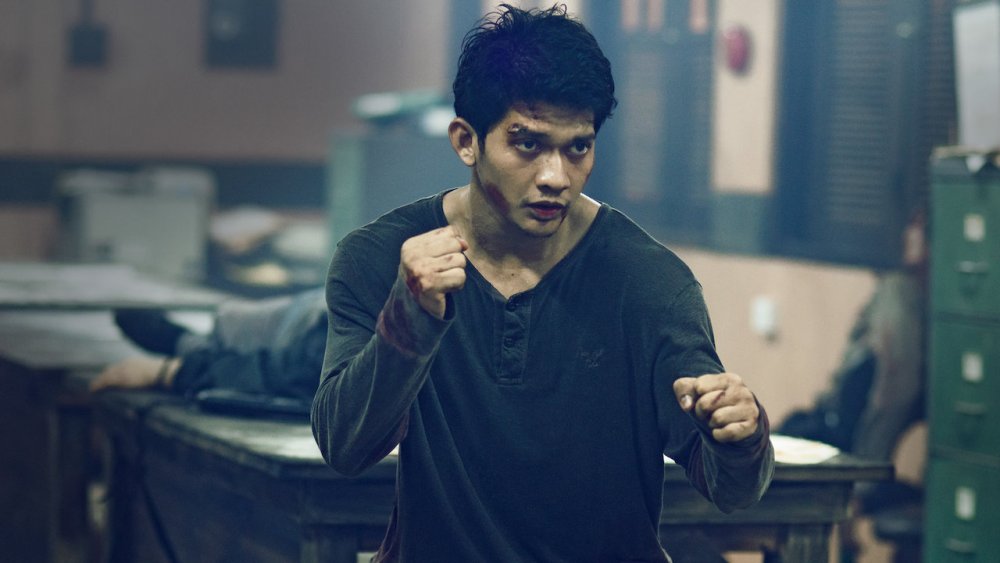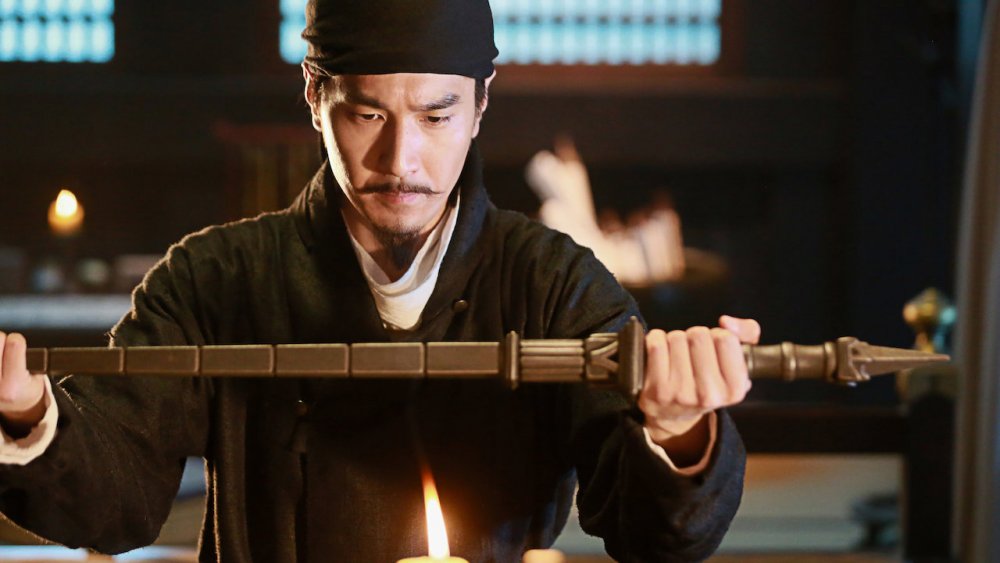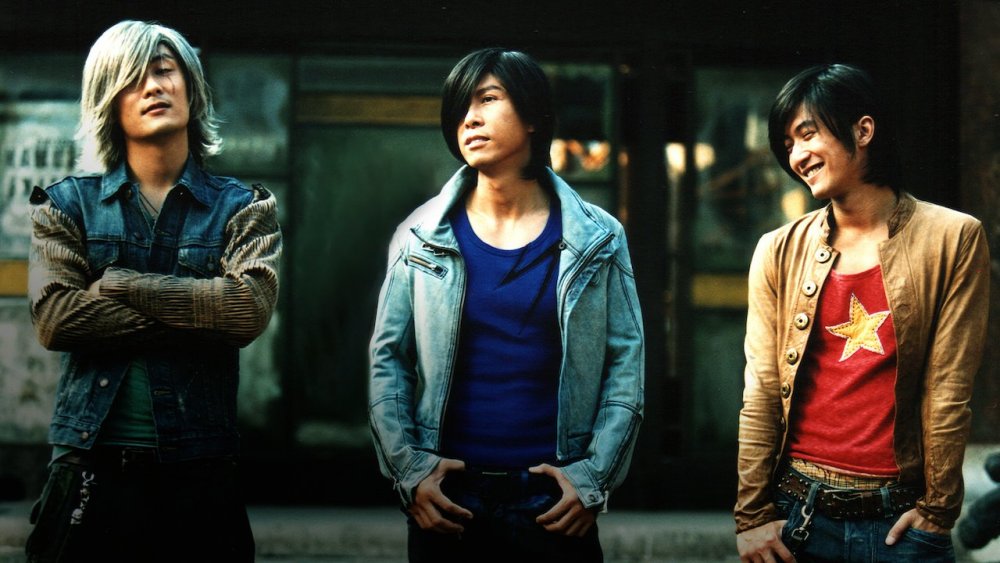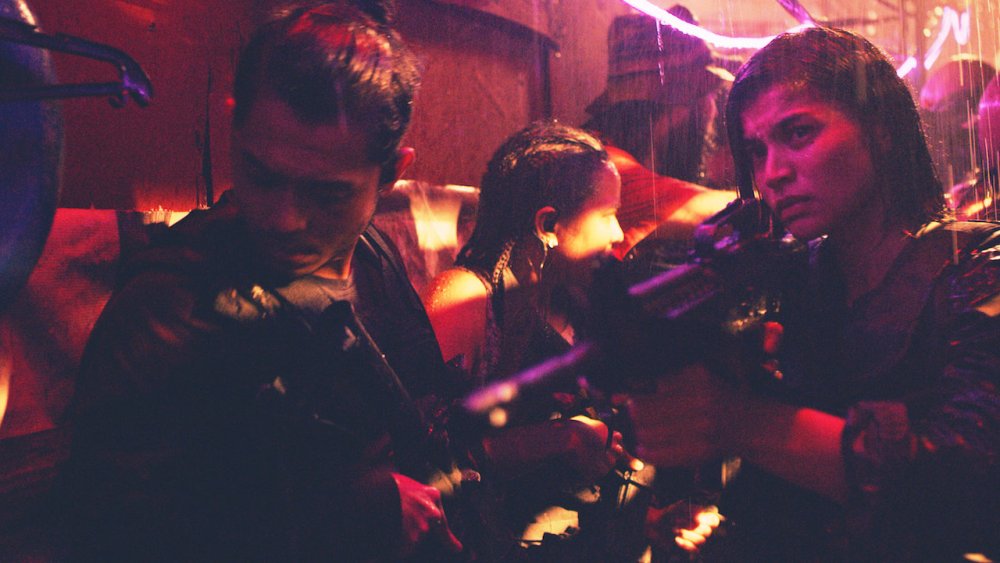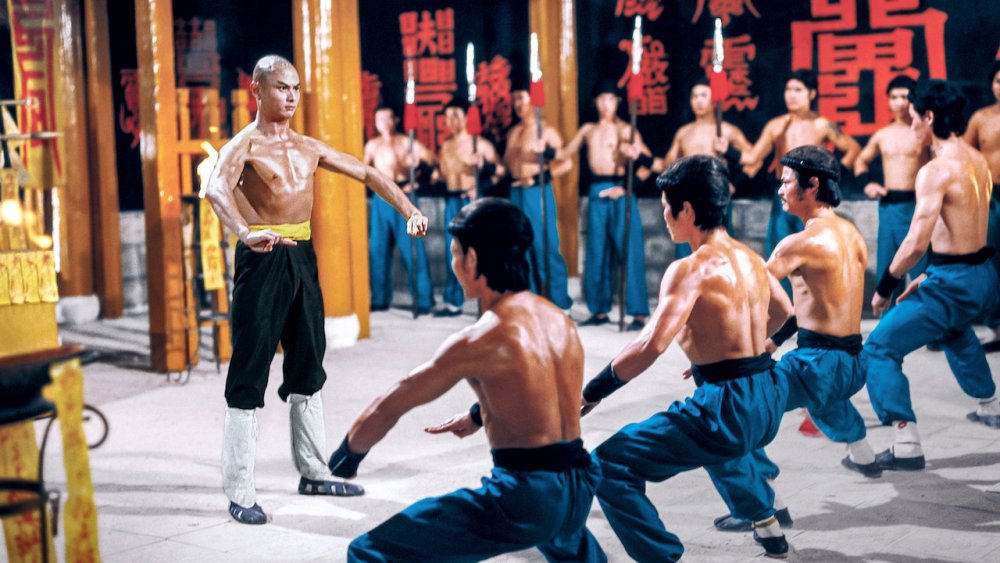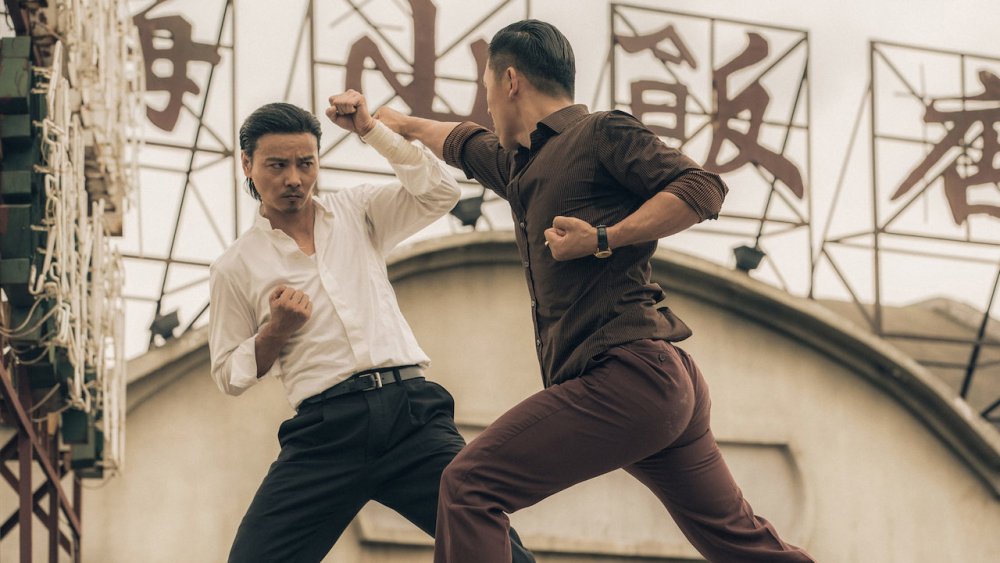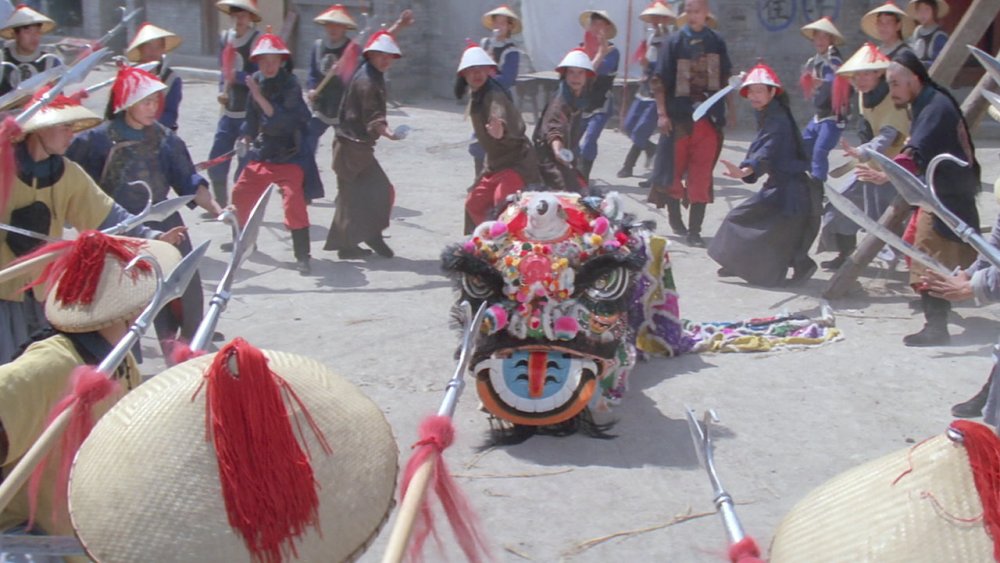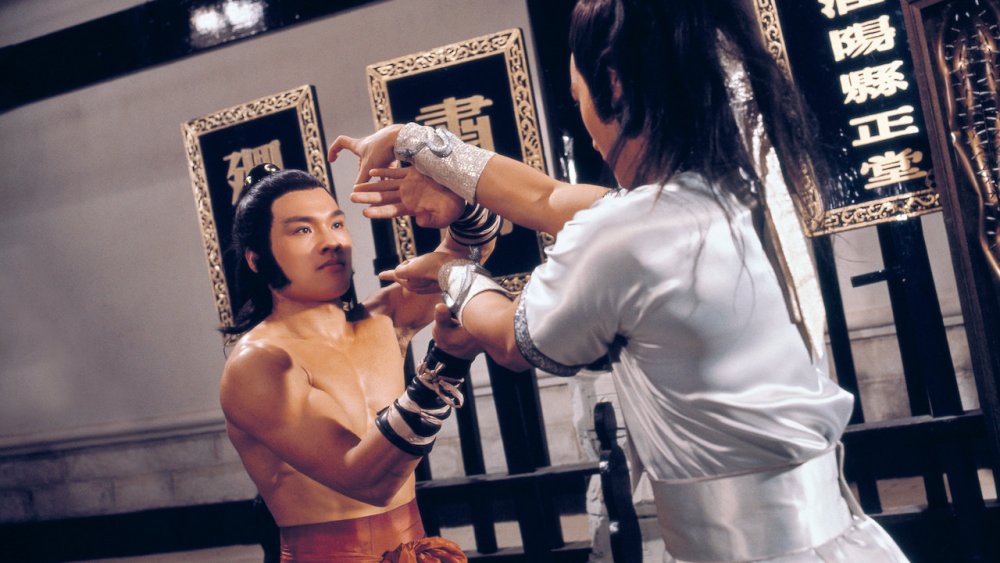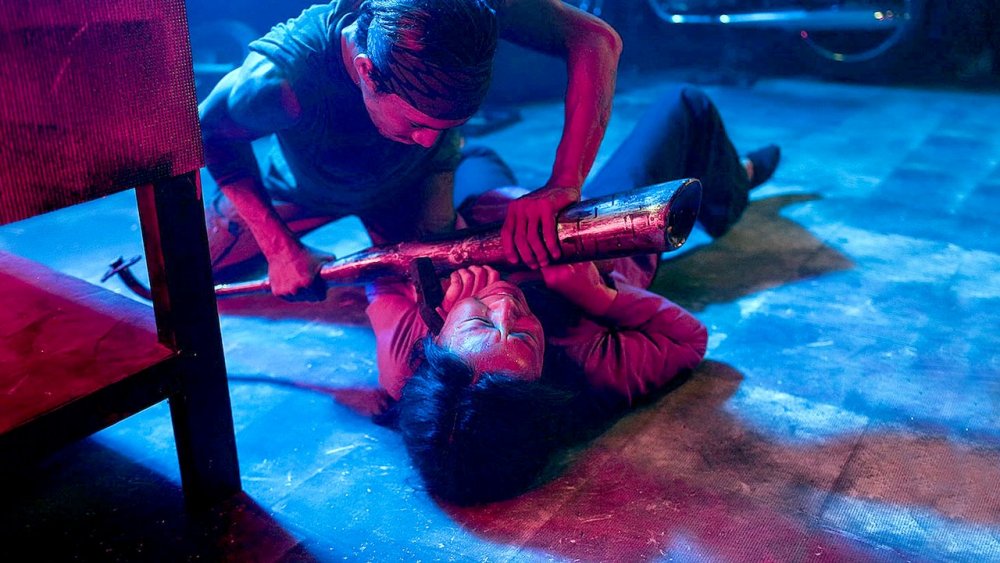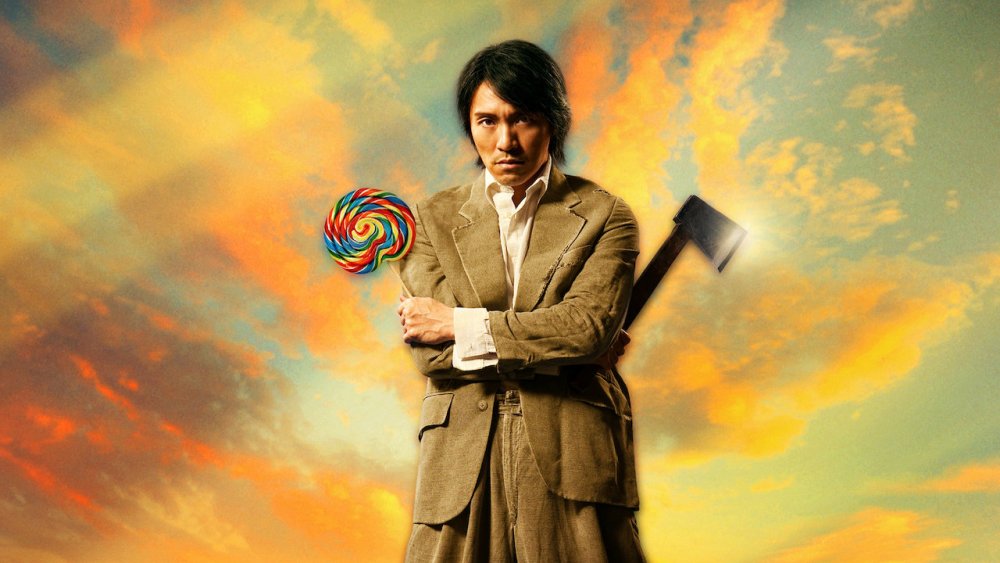Hidden Martial Arts Gems On Netflix You Need To Watch
This content was paid for by Netflix and created by Looper.
The human body is an amazing thing, and there's no better showcase for it than a martial arts movie. Martial arts films aren't just exhibits for spectacular stunts and breathtaking action scenes. The talented men and women who make them use their bodies to tell stories. All different kinds, too. While the term "martial arts" probably makes you think of fights — and yeah, there are a lot of those — the genre is home to gritty crime dramas, fantasy yarns, slapstick comedies, and everything in between.
Unfortunately, all that variety comes with a downside. Outside of a few well-known classics, it can be very difficult to know where to start. Do you begin with the '60s and '70s exploitation flicks that made "kung fu" a household word? Do you fire up one of the more bloody and brutal modern-day action flicks, and work your way backwards? Maybe a biopic, which will teach you about the origins of the martial arts movie scene, is the best way to kick things off.
While seasoned fans of martial arts cinema have probably seen most, if not all, of these movies before, the following hidden gems are great places to kick off your journey into this eclectic and exciting genre. Martial arts movies really do have something for everyone. You just have to know where to look.
Headshot
If you're interested in modern martial arts movies, you should become very, very familiar with actor Iko Uwais. Quite simply, he's one of the very best out there. Uwais was working as a driver for an Indonesian telecom company when director Gareth Evans showed up at the gym where Uwais trained in silat, a Southeast Asian martial art. As Uwais says, it was love at first sight. Evans was impressed by both Uwais' charisma and his smooth moves, and immediately cast him in Merantau, his first action movie.
However, it was Evans' second feature, The Raid, that made Uwais one of the biggest names in martial arts cinema. He's never looked back. For Headshot, his duties are bigger than just starring, too. In addition to playing the film's lead, he was the film's fight choreographer, and spent three weeks making sure all of Headshot's action scenes were as brutal, bloody, and beautiful as possible. To do so, Uwias gave each character their own unique fighting style, based on the actor's own background. As a result, every action scene is a blend of different martial arts. It's just as thrilling as it sounds.
Headshot tells the story of an amnesiac who's forced to rescue the doctor who nursed him back to life when the gang who raised him comes back for revenge, but really, the story is secondary. You're here to watch Uwais and his co-stars do seemingly impossible stunts and kick some butt. On those fronts, Headshot more than delivers.
Detective Dee: The Four Heavenly Kings
In some ways, it's easier to say what Detective Dee: The Four Heavenly Kings isn't. It's based on a real person, but it's not a historical drama. It's the third film in a series, but it also stands completely alone — it's actually as a prequel to the first film in the franchise, the critically-acclaimed Detective Dee and the Mystery of the Phantom Flame. The word "detective" is in the title, but it isn't really a mystery film. Really, Detective Dee: The Four Heavenly Kings is a fantasy story with some martial arts action mixed in. Everything else is secondary.
In The Four Heavenly Kings, Dee Renjie receives custody of the legendary Dragon Sword, making him a direct threat to the powerful Empress Wu Zetian. In retaliation, Wu sends four hitmen — who happen to be both talented martial artists as well as sorcerers — to get the sword back. Dee goes into hiding, but is forced to return when a giant dragon statue comes to life, causing havoc in the court.
So, yeah, Detective Dee: The Four Heavenly Kings isn't the most grounded martial arts movie out there, but it's a fun one. Even better, if you enjoy it, there's a ton of other media out there featuring Di Renjie. We recommend starting with author Robert van Gulik's Judge Dee novels. Those are more traditional detective stories than fantasy yarns, but they're just as much fun.
Dragon Tiger Gate
Western audiences probably know martial artist Donnie Yen best from his turn as the blind Force acolyte Chirrut Îmwe in Rogue One: A Star Wars story, but Yen's journey to a galaxy far, far away only showcased a fraction of his talents. Take Dragon Tiger Gate, for example. In Dragon Tiger Gate, not only does Yen prove he's more than capable of holding down a leading role — hey, he's one of Asia's most popular and highest-paid actors for a reason — but he also handled all of the fight choreography. Impressed by Dragon Tiger Gate's action scenes? You've got Yen to thank.
Dragon Tiger Gate tells the story of two half-brothers, Dragon and Tiger, who learn of one another's existence the hard way: by getting into a knock-down, drag-out fight in a restaurant after Tiger runs afoul of Dragon's mob lord boss. Still, nothing brings siblings together like a brawl, and it's not long before they've officially reunited at the Dragon Tiger Gate martial arts academy, ready to take on all comers.
Dragon Tiger Gate has an interesting history, too. It's based on Oriental Heroes, the very first action manhua (or comic — think manga, but Chinese), which debuted in 1970 and is still being published today. It also holds one of the oddest Guinness World Records of all time: one of the film's props is officially the world's largest punching bag, making Dragon Tiger Gate the first Hong Kong movie to be recognized by the organization.
BuyBust
From the very beginning, you know that BuyBust's titular drug bust is going to go bad. Nina Manigan, the newest member of the Philippine Drug Enforcement Agency's elite strike squad, more or less says as much before the deed goes down — and if anyone would know, it's her. Manigan is only on this job because her former team was wiped out thanks to some corrupt officers. It seems inevitable that history is going to repeat itself.
So, no, it's not all that surprising when you learn that the PDEA is walking straight into a trap, or when the bodies start dropping by the dozens. What is surprising, however, is that BuyBust also comes with a striking, if unsubtle, undercurrent of political commentary. In BuyBust, regular civilians are so fed up with the Philippines' war on drugs, which has led to rampant corruption and is regularly cited as one of the biggest violations of human rights on the planet today, that they join the fray, taking the fight to their presumed oppressors.
Not that the political message gets in the way of the action, which is just as brutal as it is stylish. In fact, the film's second biggest surprise is that Anne Curtis, who's mostly known as a romantic comedy lead and TV show host, can so capably anchor an action movie. It would be a star-making performance — if, y'know, she wasn't already a star.
Legendary Weapons of China
Liu Chia-Liang is widely regarded as one of the best, if not the best, director of kung fu films. Legendary Weapons of China proves why. While Legendary Weapons of China doesn't have the same cultural cache as 36th Chamber of Shaolin or Jackie Chan's later Drunken Master movies, some consider it the single best showcase of Liu Chia-Liang's unique talents.
In Legendary Weapons of China, Liu himself stars as Lei Kung, a martial arts master who decides that traditional kung fu will never be able to beat invading foreigners' guns. Instead of risking the lives of his students, he goes into hiding, raising the ire of his peers. With morale dropping, the other instructors decide they want Lei Kung dead, and send some of their most talented fighters to get the job done.
What follows is a non-stop barrage of kung fu action, capped off by an epic fight scene between Liu and his real-life brother, Liu Chia Rong, in which almost all of the film's titular weapons — there are 18 of them, by the way — come into play. It's 10 of the best minutes of martial arts action you'll find anywhere, and proof that when Liu was on the top of his game, no one was better.
Master Z: Ip Man Legacy
Even if you're not a martial arts movie buff, you might've heard of Ip Man, which was a minor phenomenon when it came out in China. The biographical film, which stars Donnie Yen as the martial arts master best known for training Bruce Lee, was popular enough to spawn three sequels, won Best Picture at the Hong Kong Film Awards, and earned Yen some of the best reviews of his long and storied career.
Master Z: Ip Man Legacy isn't nearly as well known. There are a couple of reasons why. For one, Yen is only a producer in the film, not the star, although Master Z does boast big-name cast members like Crouching Tiger, Hidden Dragon star Michelle Yeoh, Guardians of the Galaxy scene-stealer Dave Baustista, and martial arts legend Tony Jaa. For another, Master Z's lead character, Cheung Tin-chi, is only loosely based on a real person. In Ip Man 3, when the character debuted, Cheung Tin-chi is clearly a stand-in for real-life martial artist Sum Nung (the character's name was changed to avoid controversy), but Master Z's plot is completely fictional.
Still, director Yuen Woo-ping knows how to put together one hell of a fight scene — you've probably seen his work as fight choreographer in The Matrix, Crouching Tiger, Hidden Dragon, and Kill Bill — and in terms of production design and cinematography, Master Z certainly looks great. It's a pulpy crime thriller, not a historical drama, but that's fine. Just don't expect Ip Man, and you'll have a great time.
Martial Arts of Shaolin
The Shaolin franchise, which began in 1982 with The Shaolin Temple, is important for a few reasons. For one, the movies — especially the first one — were so popular that the real-life temple featured in the film became a popular tourist destination, leading to a complete revitalization of the once-decrepit structure. For another, they marked the feature film debut of a young martial arts prodigy known as Jet Li. You've probably heard of him.
Martial Arts of Shaolin is actually the third film in the series, following The Shaolin Temple and Kids From Shaolin, but you don't need to worry about catching up. While the Shaolin movies share the same cast, they play different characters in each installment, and the stories stand completely alone. In Martial Arts of Shaolin, Li stars as a monk named Zhi Ming who must go on the run after he fails to assassinate the warlord who kills his parents.
The plot is pretty thin, but Martial Arts of Shaolin makes up for it by dropping a new action scene every couple of minutes. It's also a surprisingly beautiful film. Many kung fu films look kind of rinky dink, but Martial Arts of Shaolin clearly had a massive budget. Not only was much of it filmed on location in mainland China — you'll see both the Great Wall and the Forbidden City in the movie — but the lavish sets and costuming are really stunning. Naturally, the fights look fantastic too, but with Jet Li involved that's pretty much a foregone conclusion.
The Five Venoms
It's no secret why The Five Venoms (which is also known as The Five Deadly Venoms and Five Poisons) is a cult favorite and arguably one of the best kung fu movies of all time. From its opening frames, the movie just oozes cool. Watch the first ten minutes, and you'll see what we mean. It begins when a dying martial arts master begins to tell his latest student about his five former students, some of whom may be evil, and it isn't long before you're watching masked warriors kick plates out of the air, run up the sides of walls, and perform all kinds of seemingly inhuman feats of strength and agility.
See, each one of the titular warriors fights with a unique style, loosely based on the animal from which they take their name. The Centipede, for example, is preternaturally quick. Getting kicked by the Scorpion is like getting stung. The Lizard can, quite literally, stick to walls, Spider-Man-style. Even better? Because they all wear masks, nobody knows who they really are. That's a problem for the young sixth student, who must track the Venoms down in order to protect a secret treasure, but as the setup for an action movie, it's pretty great.
At any rate, when The Five Venoms first came out, it was hugely popular among genre fans and made its cast into huge stars. They became known as the Venom Mob, and along with The Five Venoms director Chang Cheh went on to make a number of films together, but if you only have time to watch one, The Five Venoms is undoubtedly the best.
Furie
If Furie has a moral, it's this: Don't mess with Veronica Ngo. Oh, sure, she proved she was tough during her brief but memorable appearance in The Last Jedi (Ngo played the Resistance bomber who sacrificed her life to take out a Star Destroyer), but in Furie she takes it to a whole new level.
See, Ngo's character, Hai Phuong, has a very particular set of skills, and while she initially uses them to make ends meet as a collector for a shady loan shark, they come in very, very handy when her daughter is abducted and sold to organ traffickers. What follows is a rampage across Ho Chi Minh City as Hai pulls out all the stops to find her kid, busting kneecaps and heads along the way.
Ngo isn't the only woman in the cast who gets a chance to shine. In fact, in a genre that's largely dominated by men, Furie is refreshingly female-oriented. Thanh Hoa plays the leader of the black market organ ring and proves to be a more than worthy nemesis for Hai, while all of Hai's main allies are united by their shared womanhood. Still, Furie is Ngo's show. As a martial arts flick, it's very good. As a showcase for Ngo's talents, it is excellent.
Kung Fu Hustle
First of all, if you've never seen a kung fu movie before, don't start with Kung Fu Hustle. Watch a couple of other movies on this list first. Don't worry. We'll wait.
Back with us? Good. See, Kung Fu Hustle, Stephen Chow's follow-up to his massively popular martial-arts-sports comedy Shaolin Soccer, isn't just a martial arts movie. It's an absurd comedy and a love letter to the kung-fu flicks of the '70s. For Kung Fu Hustle, Chow lured martial arts stars like Bruce Leung out of retirement, giving them their first screen roles in decades. The movie's fight scenes were choreographed by Yuen Woo-ping, who'd been working in martial arts cinema for over 30 years. It's filled with classic film references, too, and pays homage to everything from Enter the Dragon to The Matrix.
You can absolutely enjoy Kung Fu Hustle without a solid background in martial arts films. It's a special effects-heavy movie that transforms Chow and his co-stars into living cartoons, and its over-the-top fight scenes need to be seen to be believed. However, you're going to get much more out of it if you're aware of the genre's tropes and history. Don't worry, though. By this point, you're an expert.
